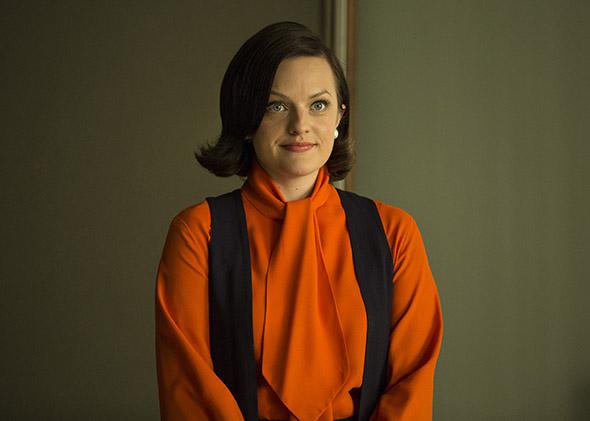What does it take to finally break the ever-composed Joan? It wasn’t just the boorish behavior by male colleagues. She’s dealt with plenty of that before. It wasn’t the condescension, which she’s used to. (“He’s got a wife and three children. He’s not going to work for a girl.”) It wasn’t even the insistent propositioning from a man she can’t rebuff without consequences. She’s dealt with that too, and even submitted to it, which is how she became a partner in the first place. What finally gets her is the dawning realization of just how protected she’s been all these years by her close relationships with people at SC&P, and how vulnerable she is without them.
Joan is now actually working for The Man—the generic patriarchy crowded into gray claustrophobic hallways with forgettable art. Her old protectors are scattered on different floors. She has to make an official lunch date with Don, for God’s sake! In that kind of work culture, the jagged and unorthodox path she’s cut to the top doesn’t translate into a recognizable résumé. She’s just the “redhead,” not to be taken seriously. I’ve complained before about the clunky feminist plotlines on Mad Men, but this one contained a few surprises. That girlfriend welcoming party bearing the houseplant, for example. They offered Joan promises of solidarity, with their invitation for drinks at the oyster bar (“Just a bitch session. Strictly consciousness-lowering.”) Finally, we thought for a moment, Joan and Peggy are not alone! But as Joan figured out quickly, the sisters were not to be trusted. They were after her business and happy to throw Peggy under a bus in order to get it.
And the biggest surprise was that Joan lost. I fully expected after she made her threat to summon Betty Friedan and the ACLU, and did it with such a power pose on that couch, that she would get what she wanted. But she didn’t, really. Instead, she gave up and took the 50 cents on the dollar, maybe because even Roger didn’t believe she could do any better. It was a convincing plotline, and heartbreaking to watch Joan, after all she’s been through, defeated. My one problem with the development is that it depended on such obvious villainy. Typically on Mad Men the demons are internal, or historical, or temporarily conjured. But this episode depended on some pretty crudely-drawn enemies. The bros at McCann were like guys you usually encounter only on workplace training videos about sexual harassment.
Or perhaps Joan’s defeat set us up for Peggy’s spectacular victory, not just at McCann but in the world of pop culture at large. The episode had scarcely ended before videos popped up of Peggy in her red blouse roller skating through the abandoned offices of SC&P, while Roger played the mysterious organ. And Twitter was full of pictures of the final triumphant scene, of Peggy walking down the hallway of McCann with her Orientalist Octopussy picture in her hands. I’m not really sure what wisdom Roger imparted to Peggy (if either of you could unpack his Navy story for me I’d be grateful). But I do know it was a thrill to have them spend time together and that he must have imbued her with some special Roger-ness that allowed her to strut down those hallways with her badass sunglasses and her cigarette dangling, ready to take on the bastards of McCann. (In my imagination, she ended the walk by putting her cigarette out in the houseplant.)
John, you made the uncanny prediction of the season! You guessed last week that Don would road trip to Racine, Wisconsin, in search of Diana, and he does just that. He makes his escape in the most Don way possible, which is to walk out mid-meeting.* He chooses the moment when someone at McCann is making a pitch for a new low calorie beer. (And whenever you hear the words “exciting new beverage” you know it’s time for the hero to depart.) The pitch involves a man with “specific qualities” who is in fact utterly generic—has a lawnmower, a bunch of power tools he never uses. “We all know this man because there are millions of him.”
Don had earlier been told by the heads of McCann that he was brought in to bring the firm “up a notch.” At the meeting he overhears Ted say he got the same line. It’s the firm’s boilerplate flattery, and learning that somehow liberates Don. He has no special mission at McCann. He’s just one of the dozens of creative directors crammed into the room: “There are millions of him.” So when he spots the skywriter out the window he takes it as a sign meant for him alone, and he gets up and walks out.
John, what do you make of his visit to the Bauer house? Could Diana really ever have been married to that man? (The daughter is hers, no doubt. Same stunted expression.) And Julia, do you think they’ve gone overboard with Meredith’s competence? She not only answers phones, she cooks! And does interior decorating! Finally, how do you both feel about the utter finality of this episode? SC&P literally doesn’t exist anymore, and it never will again. The furniture is gone, the members are scattered, and their overlords are determined to wipe away any trace of them. I’m already feeling nostalgic.
Hanna
Read the previous entry by Hanna Rosin.
*Correction, May 6, 2015: This piece originally misidentified the waitress as Diane. (Return.)
